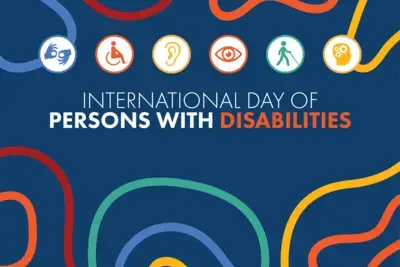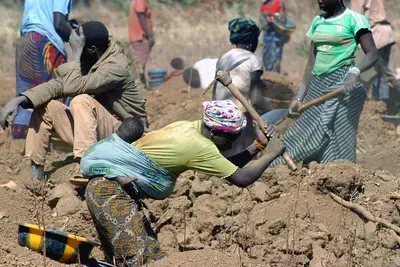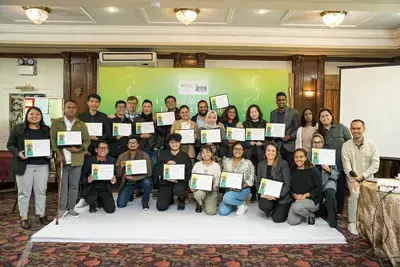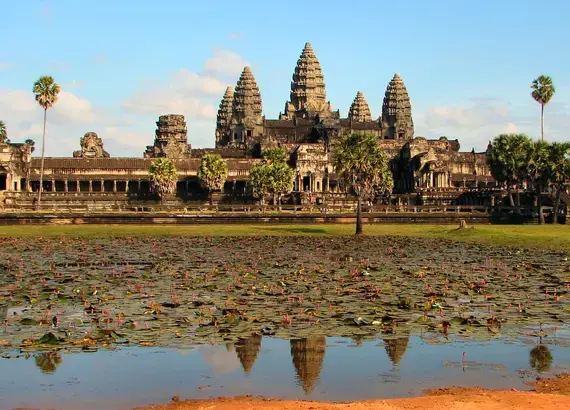
Angkor Wat, the front side of the main complex, photographed in the late afternoon Credit: Bjørn Christian Tørrissen
Success Story
Cambodian Crackdown on Democracy Forces NDI to Close Offices
On August 23, 2017 NDI received a letter from Cambodia’s Ministry of Foreign Affairs and International Cooperation ordering the Institute to close its office and expelling its international staff from the country. The government’s action against NDI was part of a larger and intense campaign against independent media, the political opposition and civil society. The crackdowns are taking place in the lead-up to the July 2018 elections, which are expected to be closely contested.
Over the past 25 years, NDI had worked in Cambodia on a broad range of activities, including organizing hundreds of candidate debates and local public forums, assisting civil society on electoral reform and monitoring issues, and strengthening the country’s political parties. At the time the letter was received, NDI’s activities included providing assistance to citizen election monitoring groups under a formal agreement with the National Election Commission (NEC); developing programs to increase village-based political participation; and working intensively with the ruling Cambodian People’s Party (CPP) and opposition parties, including the Cambodia Rescue Party (CNRP), on their preparation for commune council, and later national elections.
In recent months, the political situation had rapidly deteriorated as opposition parties and independent voices of dissent came under increasing government pressure. According to a narrative current among autocratic regimes, opposition and independent voices are internationally inspired movements designed to replace existing governments with ones more acceptable to western democracies. In fact, what NDI had worked on in Cambodia was the opposite: transparent elections in which political parties can participate constructively and accept the outcome irrespective of who wins. Such a process is the best antidote to domestic upheaval.
The letter from the Ministry of Justice and International Cooperation expelling NDI made no mention of political bias, and focused solely on NDI’s registration status. NDI had, in fact, made every effort to comply with all of Cambodia’s laws, including the Law on Associations and Non-Governmental Organizations (LANGO). The Institute filed all of the required documents with the Ministry of Foreign Affairs and International Cooperation, including a Memorandum of Understanding with the National Election Commission. The Ministry formally accepted NDI’s application on September 21, 2016. Under LANGO’s Article 14, the Ministry must decide within 45 working days on whether to approve an application for registration. However, the deadline passed without a response.
On the advice of Phnom Penh-based legal counsel, NDI began limited direct programming after the 45 days had expired. This included working with the CPP and CNRP on political party trainings as well as providing assistance to domestic election monitoring groups. During the succeeding 11 months, NDI was in frequent contact with government officials and regularly informed them of the Institute’s work. NDI also worked cooperatively with the Ministry of Interior in implementing the Institute's village-based political participation program. At no time during this period did the Cambodian government or any political party communicate to NDI any concerns about its programs or presence in country. The timing of the directive expelling NDI was especially ironic since earlier that day NDI staff had met with the ruling party’s official liaison to the Institute and was told that the CPP wanted to continue with NDI’s trainings despite attacks in official media.
Throughout the world, NDI works with political parties as essential building blocks of a democratic political process. In Cambodia, NDI’s work embraced the two major political parties, CPP and CNRP, as well as some smaller ones. The Institute’s programs included trainings on campaigning and sessions on topics such as messaging, public speaking and voter outreach. The program also included workshops on campaign organization -- an important program component because if political parties can participate effectively in the electoral process by making sound strategic choices, they are more likely to accept the results of that process. In Cambodia, NDI offered each of the main political parties the same menu of party-strengthening activities, and they selected those that met their particular needs. The parties themselves, in consultations with NDI, determined both the number of participants who would attend the trainings and workshops, and the level of the party hierarchy from which they would be drawn. NDI’s workshops methodology was the same for each party. Experienced trainers led interactive sessions in which they would use motivational slides and ask provocative questions, leading the participants to examine their party’s strengths, as well as those of their opponents.
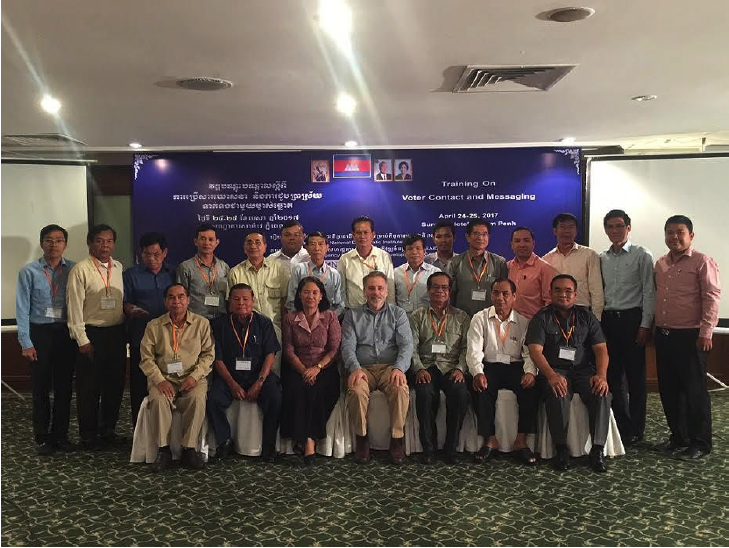
The Cambodian People's Party pose for a photo at a training voter contact and messaging
NDI provides training for the ruling Cambodian People’s Party
The crackdown against democracy in Cambodia is creating a pervasive atmosphere of fear as the national elections approach. Perhaps most telling, on September 7, CPP leader Hun Sen, in power for 32 years, vowed to stay in office for another decade in order to ‘maintain stability’. Many Cambodian had hoped that the upcoming national elections would be different than those of the past. The government’s actions undermine the recent progress that was made in establishing an election commission that has acted in an independent manner by developing a much improved voters list and holding commune council elections widely viewed as reflecting the will of the people.
Credible elections, however, require the active participation of civil society, a free media and the ability of political parties to fairly compete in the political process. Elections held under current conditions are far from meeting those requirements and would lack democratic legitimacy.
It is not too late for the Cambodian government to reverse course and return to a more democratic path. By releasing the opposition leader Kem Sokha, permitting Sam Rainsy to return, permitting independent media to operate without interference and allowing all opposition parties to compete on a fair basis, Cambodia could once again commit to fulfilling the promise it made 25 years ago. For itself, NDI would look forward to returning to Cambodia to resume its nonpartisan program work.
